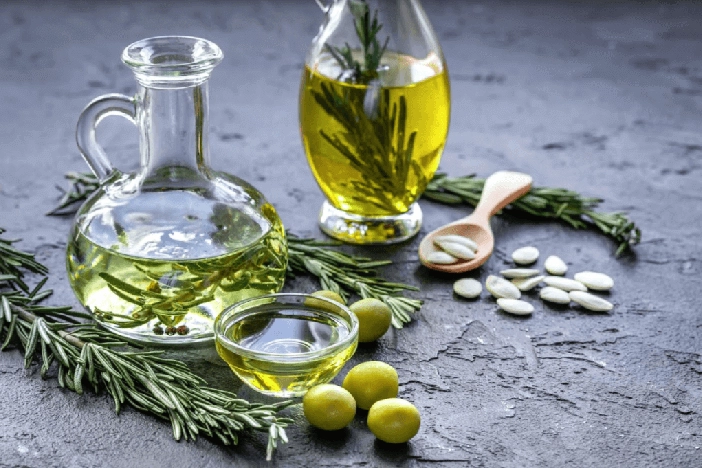Vitamin E - Protect your body with natural antioxidants

What is vitamin E?
Vitamin E is a micronutrient and the umbrella term for various substances that perform similar functions in the body but differ in their chemical structure. Vitamin E is one of the fat-soluble vitamins that can be stored in the body. It is stored in the fatty tissue and the adrenal glands. The two main groups are tocopherols and tocotrienols. These are each divided into further groups. In total there are 8 compounds, but the most important for humans is the a-tocopherol, which is found in 90% of the human organism. Unprocessed vitamin E is mainly found in vegetable oils.
More about vitamins and other micronutrients can be found in our Nutrients section.
Why is vitamin E so important?
Vitamin E has an antioxidant effect, which means it protects your body from harmful oxidation of free radicals. These accumulate in the metabolism and are responsible for the development of many diseases in the organism. Vitamin E works in the cell membrane and intercepts free radicals there. It therefore has a cell-stabilizing effect, as otherwise cell damage could occur. In addition, vitamin E is involved in various cell biological processes, resulting in the following effects:
- Anti-inflammatory: influences blood coagulation and the release of inflammatory cells
- Neuroprotective: Vitamin E is important for the development and maintenance of the nervous system and skeletal muscles.
- Anticarcinogenic: Can prevent or at least delay the mutation of cells and thus also diseases such as cancer.
Antioxidants protect your body from free radicals (waste material of the body’s own metabolism).
Daily vitamin E requirement (in mg/day)
| Age | Males | Females |
|---|---|---|
| Young people 15 to under 19 years | 15 | 12 |
| Adults 19 to under 25 | 15 | 12 |
| Adults 25 to under 51 years | 14 | 12 |
| Adults 51 to 65 years | 13 | 12 |
| Adults >65 years | 12 | 11 |
| Pregnant women | – | 13 |
| Breastfeeding | – | 17 |
* D-A-CH reference values for nutrient supply, 1 edition 2015
Which foods contain a lot of vitamin E?

The following are good sources of vitamin E:
- Wheatgerm Oil
- Maize-germ oil
- Sunflower seeds
- Sunflower oil
- Soybean oil
- Nuts, seeds and other vegetable oils
Vitamin E deficiency

Healthy people are not at great risk of getting a Vitamin E deficiency. Our Vitamin E requirements are easily covered through a balanced diet containing the above mentioned foods.. The intake of fat is essential here, as Vitamin E is a fat-soluble vitamin and can therefore only be absorbed in conjuntion with fat.
Reasons for a deficiency despite a healthy diet:
- Very low-fat or unbalanced diet
- Chronic diseases that disrupt the absorption of dietary fats via the intestines. These include celiac disease, Crohn’s disease of the small intestine, chronic pancreatitis, short bowel syndrome or biliary tract diseases.
Complaints that may be experienced by those affected include disturbances in muscle and nerve function.
Tips for an optimal vitamin E supply
- Build natural sources of fat into your diet. Nuts and seeds are high in fat and you only need a small amount to cover your needs.
- For example, add a dash of olive oil to a salad dressing.
- Sunflower seeds or other seeds or nuts are also good for a salad topping.
- But don’t overdo it. Fat is high in calories and your vitamin E needs are quickly met. So avoid unnecessary fat intake. And be careful: not all fats are good.
The recommended daily dose can be covered by 20 ml sunflower oil, for example.
Frequently asked questions and answers
Good sources of Vitamin E are wheat germ oil, corn oil, sunflower seeds, sunflower oil and soya oil. The recommended daily dose of Vitamin E can be covered by 20 ml sunflower oil.
Vitamin E has an antioxidant effect, which means it protects your body from harmful oxidation. It also stabilises the cell membranes.
An overdose of vitamin E will not occur in a normal diet. However, if vitamin E supplements are taken and the dose exceeds the daily intake recommendations, gastro-intestinal problems such as diarrhoea can occur.
